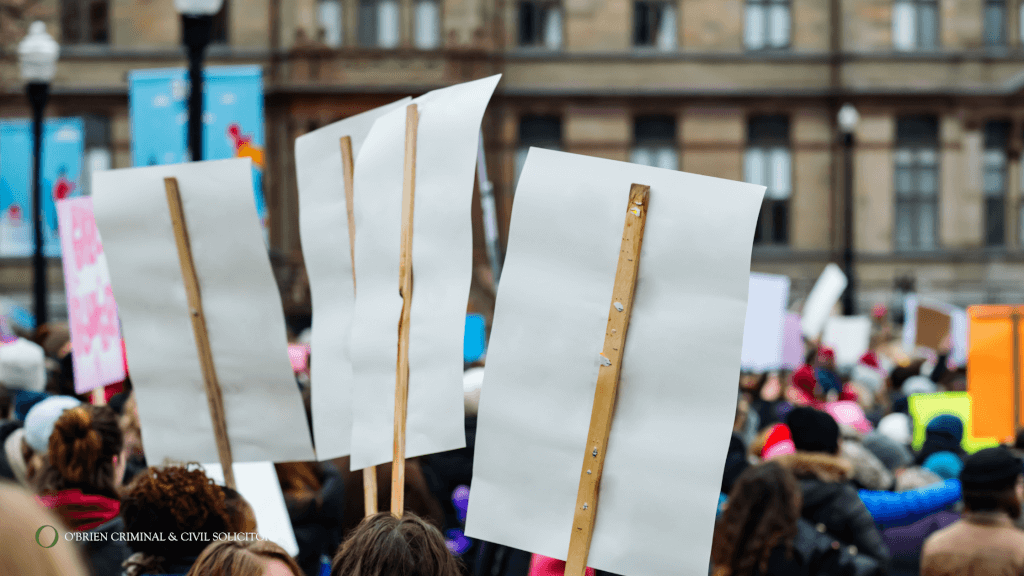In recent events, the delicate balance between the right to protest and public safety has come under scrutiny in Australia. Two incidents highlight the complexities surrounding protest laws and their enforcement. Let’s explore the recent protests in Sydney.
Pro-Palestine Protests in Sydney
The New South Wales Police Force faced a legal challenge when they attempted to prohibit a pro-Palestine protest planned for Sydney’s CBD. The Supreme Court ruled against the police, allowing the demonstration to proceed. This decision underscores the importance of protecting the right to peaceful assembly and free speech, even in contentious situations.
Hezbollah Flag Controversy
In a separate incident, tensions arose when a man was arrested for displaying a Hezbollah flag during a protest in Sydney. The arrest occurred amidst heightened concerns over the Israel-Lebanon conflict. This event raises questions about the limits of expression during protests and the role of law enforcement in maintaining public order while respecting individual rights.
Legal Framework of protests in Sydney
Australia’s approach to protest rights involves a delicate balance:
Freedom of Assembly: The right to peaceful protest is generally protected under Australian law.
Public Safety: Authorities have the power to impose restrictions on protests to ensure public safety and order.
Prohibited Symbols: Some jurisdictions have laws against displaying symbols associated with terrorist organizations.
Challenges and Considerations
The recent events highlight several key issues:
1. Balancing Rights: How to protect the right to protest while addressing security concerns.
2. Consistency in Enforcement: Ensuring that protest laws are applied fairly and consistently.
3. Cultural Sensitivity: Navigating complex geopolitical issues in a multicultural society.
As Australia continues to grapple with these challenges, the ongoing dialogue between law enforcement, the judiciary, and civil society remains crucial in shaping the future of protest rights in the country.
Fines and Imprisonment
The penalties for violating protest laws can be quite severe in some cases:
– In New South Wales, obstructing traffic during a protest can result in fines of up to 4 penalty units.
– South Australia has introduced harsh penalties of up to $50,000 or 3 months imprisonment for obstructing a public place.
– In Tasmania, laws targeting environmental protests carry penalties of up to $10,000 and four years’ imprisonment.
– New South Wales passed laws with fines of up to $5,500 for unlawful entry on land that interferes with business operations.

Specific Protest Offences
Common charges associated with protests include:
– Obstructing traffic or public places.
– Resisting or hindering police (up to 12 months imprisonment or 10 penalty units fine in NSW).
– Assaulting police (up to 5-7 years imprisonment in NSW),
– Interfering with mines or forestry operations.
– Violent disorder (up to 10-15 years imprisonment in Victoria).
– Property damage.
Expanded Police Powers for Protests in Sydney
Many anti-protest laws grant police broader discretionary powers to:
– Shut down protests obstructing traffic.
– Direct protesters to leave certain areas.
– Arrest protesters for minor disruptions to businesses.
Constitutional Challenges
Some anti-protest laws have faced constitutional challenges for potentially violating the implied freedom of political communication in the Australian Constitution. However, many restrictive laws remain in effect.
Chilling Effect on Free Speech
While not a direct legal consequence, the harsh penalties and expanded police powers are seen by some as having a chilling effect on legitimate protest and free speech.
In summary, violating protest laws in Australia can result in significant fines, potential imprisonment, and expanded police powers to shut down or restrict protests, with penalties varying by state and specific offence. The laws have been criticized for their potential to unduly restrict freedom of assembly and political expression.



